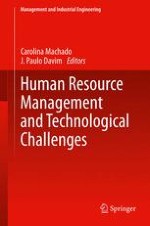2014 | OriginalPaper | Buchkapitel
4. People, Knowledge and Technology: Connecting the Dots from a Social Perspective
verfasst von : Raky Wane, Maria João Santos
Erschienen in: Human Resource Management and Technological Challenges
Aktivieren Sie unsere intelligente Suche, um passende Fachinhalte oder Patente zu finden.
Wählen Sie Textabschnitte aus um mit Künstlicher Intelligenz passenden Patente zu finden. powered by
Markieren Sie Textabschnitte, um KI-gestützt weitere passende Inhalte zu finden. powered by
